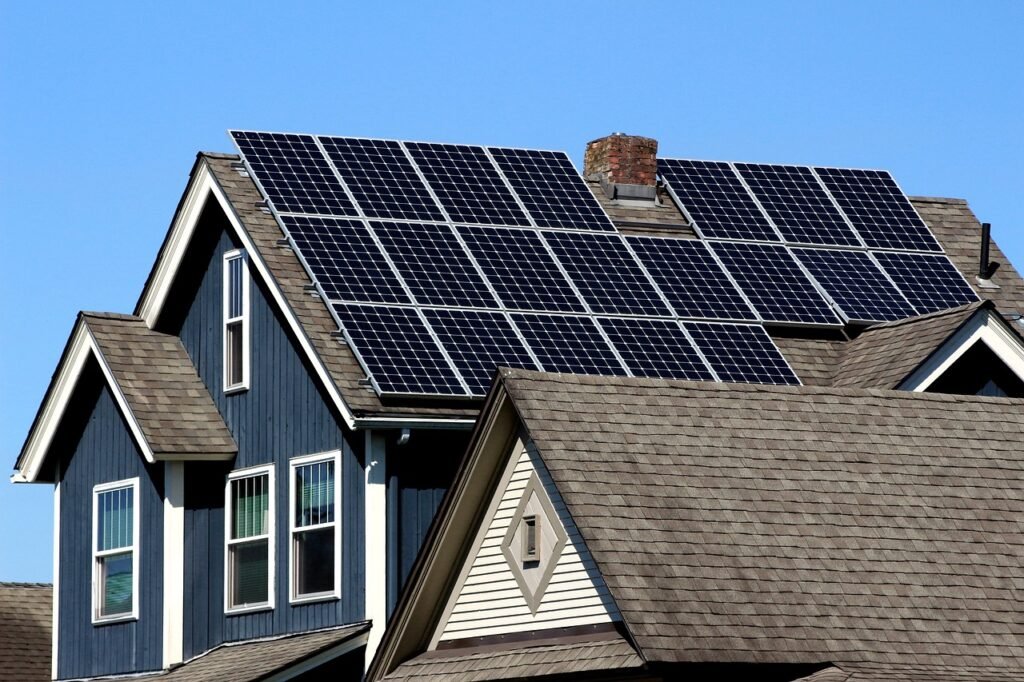Is it a good investment to install solar panels on my house?
Depending on your location, solar panels systems on your house can now provide a better return than property or investments like stocks. However, this may not always be the case.
Solar panels: what are they and how do they work?
A solar panel generates electricity by shaking up electrons within its cells when sunlight strikes it, creating a flow of energy that is delivered to a solar inverter. You can use the electricity you generate from the inverter to power everything in your home, including your lights and your refrigerator.
Some solar panel systems also include a solar battery, which will store extra solar energy the panels produce for use later. Keep in mind, not all solar panels are installed with solar batteries. In fact, the majority of solar panel systems do not include batteries; however, batteries are becoming more popular.
There is good news: you can install solar without understanding how it works. As soon as the solar company installs the system, it runs itself without any homeowner involvement.
How can you choose a solar system for your home?
The most common type of solar system installed on homes until recently was the simple grid-tied system due to its affordability. As a result of their low costs, they are the most cost-effective. It should be noted that these systems do not offer backup power when the utility grid is down.
Solar batteries are becoming more popular as a backup power source for solar systems to ensure they still function in case the grid goes down. A hybrid solar system is a residential solar system that is both battery-backed and connected to the utility grid.
Off-grid solar systems are a third type. Off-grid systems are expensive, so few people opt to go off-grid unless they live in a remote area.
Is it really possible to save money by using solar panels? Are they self-sufficient?
You can save a lot of money by installing solar panels. There is a possibility of saving well through the life of a solar panel. Four to eight years after you install solar panels, you’ll have paid off your investment. You will then get 20 years of free electricity from your solar panels!
Because of the compounding effect of inflationary electric rates, solar savings can accumulate to such large amounts. Unless you install solar, you will pay more and more for electricity over time. You can protect yourself against rising electric rates by installing solar panels.
The benefits of solar may seem too good to be true, but don’t worry – this isn’t a scam. Another reason solar panels provide such great savings is due to a utility program called net metering. Most states offer this program, which allows you to sell excess solar power you generate during the day back to your utility company at a rate similar to what you buy at night.
Despite some utilities cutting back on net metering programs if they have not already done so, not all net metering policies are created equal. Your investment in solar now is protected against future net metering changes by receiving net metering for at least 10 years.
In the event of a power outage, do solar panels still work?
When the power goes out, most people assume their lights will be kept on by solar panels. Unfortunately, they won’t run without battery storage (a hybrid system).
As a safety measure for utility workers repairing power lines, solar power systems automatically go offline during grid power outages.
When solar panels are combined with battery storage, they are the only way to power your home during a blackout.
For a home to be powered by solar panels, how many panels do you need?
To be honest, the question ‘How many solar panels should I buy? As a result, things become more complicated than they need to be, and frankly, it’s not helpful. Depending on the brand and model of solar panels you choose, you may have more or fewer panels installed on your roof.
It makes more sense to ask, “How big is the solar panel system I need? “ Watts (W) and kilowatts (kW) are the measurement units for solar systems, where kW is their maximum output.
Is it worth it to install solar panels in your home?

There is almost always a return on investment when it comes to solar panels, especially when there is a solid net metering policy in place and local solar incentives in place.
Obviously, rooftop solar panels aren’t a good fit in some cases, like if you have no place for the system, will be moving soon, or have low energy costs.
Now is the best time to go solar so that you can take advantage of net metering and the tax credit. In addition, you’ll see savings sooner, which means you’ll have more money to spend on things you really care about.
When solar panels are paired with battery storage, you can not only save on your electric bills but also reduce your carbon footprint and gain more independence.
Thanks for your reading.

